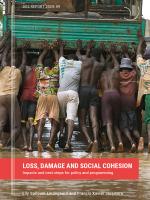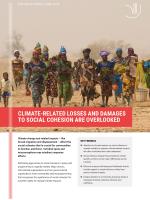Climate-related losses and damages to social cohesion are overlooked
- Attention to climate impacts on social cohesion is urgently needed, as negative climate-related impacts are often overlooked and under-addressed.
- Social cohesion programming should be context specific as there can be major differences across contexts.
- Efforts to improve well-being and livelihoods should include support to social relations as they have serious material impacts.
- Greater attention to community and group levels is necessary to boost collective cohesion and well-being.
Rethinking approaches to social cohesion in policy and programming is urgently needed. Major donors, international organisations and non-governmental organisations need contextually tailored programming that recognises the significance of social cohesion for societies’ ability to manage climate impacts.
Programming to date has focused on areas affected by conflict, insecurity, displacement and resource and livelihood stress. Our research shows social cohesion gains in one such context and major cohesion losses in a more secure setting affected mainly by climate change and forced migration.
Also, existing social cohesion programming is often based on definitions of cohesion developed from Global North perspectives. These may not fit the diverse contexts of the Global South, where other factors and mechanisms are at play.
Current approaches to social cohesion policy and programming may therefore misdirect valuable time and effort. At the same time, negative effects of climate change on social cohesion are likely severely overlooked and under-addressed.
Social cohesion generally refers to a dynamic quality of ‘togetherness’ in a society, community or group. It is often seen to include elements of shared values, identity, sense of belonging and orientation towards the common good, among others.
Social cohesion is increasingly seen as important by development and humanitarian actors as robust cohesion is expected to prevent conflict and social tensions and improve well-being.
Unexpected outcomes
Conflict, insecurity and displacement may not directly undermine social cohesion as expected. This emerges in new data on social cohesion in western Niger and northern Ghana.
The former is highly affected by armed conflict and insecurity as well as climate change and the latter by climate swings and shocks, especially irregular rainfall and flooding, and environmental insecurity. In both areas, livelihoods are under pressure and poverty is high.
In the Upper West Region of Ghana, three of four people of 304 surveyed indicate that a household member has been forced to migrate in the last five years. In the Tillabéri Region of Niger, three of four of the 254 surveyed have themselves been forcibly displaced.
Existing approaches by international development and humanitarian actors would assume greater social cohesion losses in the context of Niger than Ghana. In this study, the opposite is true. When asked about change in social cohesion over about 10 years, respondents report significant losses in Ghana and notable gains in Niger, see Figure 1.
Evidence-based, context-specific policy and programming is therefore a necessity – especially as programming on social cohesion is increasingly rolled out, targeting highly vulnerable populations.
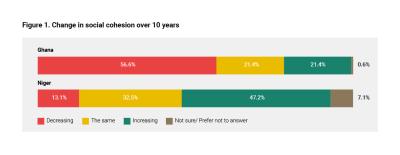
Differing factors
Many of the factors affecting social cohesion differ across Ghana and Niger and also within communities, e.g. different demographic groups are affected differently, though there are also similarities across countries.
Similarities include declines in sense of belonging and mutual support – factors often associated with social cohesion – as shown in Figure 2.
The decreases in these four factors are much more acute in Ghana than in Niger, where previous levels were lower to begin with. Strikingly, there is only a single increase – for mutual support in Niger. This may reflect increased access to support in receiving areas and could be one factor contributing to increased cohesion.
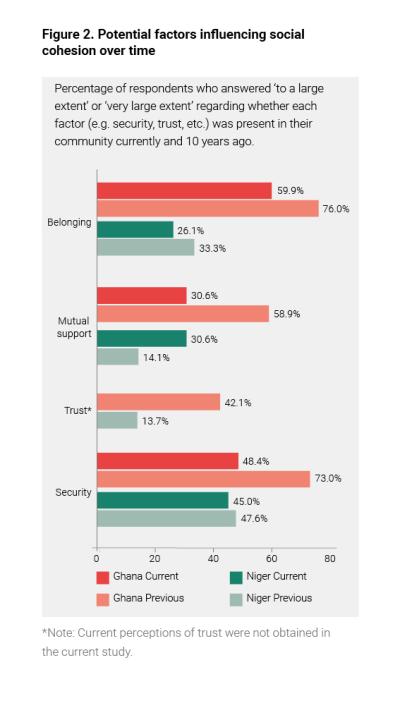
Statistical analysis reveals what factors have a statistically significant relationship with social cohesion and therefore could be relevant for programming attention: In Ghana, these include age, current security, access to social support and access to material support. In Niger, they include household size, education and current security.
In both contexts, security had a significant relationship with cohesion. In northern Ghana, security issues primarily relate to environmental insecurity and extreme climate events. This again emphasises the need for attention to areas highly affected by climate change in social cohesion policy and interventions.
Overall, efforts to improve social cohesion should be designed to assess and respond to diverse drivers within and across communities, e.g. across demographic groups, as factors shaping cohesion differ.
Climate-related losses
Within international policymaking, social cohesion is linked to climate change through ‘Loss and Damage’. Losses and damages refer to negative impacts of climate change. Importantly, losses to social cohesion, considered a kind of ‘non-economic loss’, have serious material as well as social consequences.
In Ghana and Niger, most respondents indicate that loss of social cohesion negatively impacts their material as well as social/emotional well-being, see Figure 3. Early evidence shows that similar losses are likely being experienced in many localities globally, but are going overlooked.
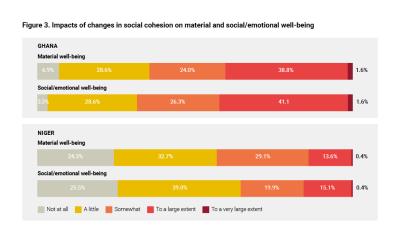
A 65-year-old woman in Ghana describes how these social and material losses are interlinked:
‘The main thing affecting our togetherness in this village is the increasing flooding…making farming difficult in the lowlands so most of our young men have migrated away. So there are fewer people during funeral celebrations and no one has enough labour to help another. Also when they migrate seasonally and return, they are now thinking of the money, so they are no longer interested in free or reciprocal labour arrangements’.
Concerningly, some of these losses are perceived to be irreversible, i.e. respondents felt negative impacts could not be improved. Therefore, even as the extent of social cohesion losses is largely unknown, some are likely already beyond repair.
Integrated approaches
In addition to social support, access to financial and material support is also significant for addressing social cohesion losses. Programming should therefore integrate material and social support to best address losses and support well-being. This could for instance be through livelihood support coupled with community activities or labour sharing – and should be contextually determined.
In addition, programming should target community and group levels, rather than solely individuals or households. Such approaches may benefit from new forms of programming and partnerships, including a major role for those affected.
Importantly, response efforts by governments, civil society organisations or local actors may create new forms of social relations and cohesion, rather than directly addressing losses. Losses should therefore be recognised, e.g. through support to processing loss.
Shifts in social cohesion may also provide opportunities, e.g. for explicitly addressing existing inequalities and marginalisation reinforced by previous social relations. This can be through focus on inclusion and equity in programming.
Ultimately, social cohesion losses are likely mounting across the globe with considerable social and material impacts. Yet blind spots and misconceptions may misdirect response efforts or overlook areas in need.
Contextually informed efforts, attention to climate impacted areas and focus on collective responses are urgently needed to improve social cohesion and address emerging losses.
This policy brief has been commissioned by the Danish Red Cross as part of the study ‘Displacement, climate change and social cohesion: exploring loss and damage dynamics’, a collaboration between the Danish Institute for International Studies and the Danish Red Cross as well as with researchers from SD Dombo University of Integrated Business and Development Studies in northern Ghana, and Red Cross Niger and volunteers in Niger. It reflects the views of the authors only.
This policy brief draws on findings in the report ‘Loss, damage and social cohesion: impacts and next steps in policy and practice’
DIIS Experts



